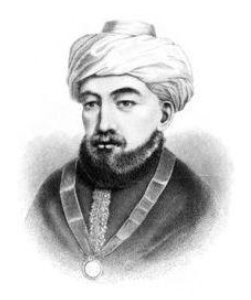Moses Maimonides or Rabbi Moshe ben Maimon is one of the greatest Jewish thinkers of the Middle Ages, who sought to reconcile the thought of Aristotle and biblical revelation.

Great Jewish intellectual of the Mediterranean, his thought enriched by Greek, Muslim and Christian cultures influenced many philosophers or theologians, in particular Saint Thomas Aquinas, Albert the Great or Spinoza, in the West and in the East.
Born in Cordoba in 1135 and died in Egypt in 1204, his life turned upside down by persecution crossed the Mediterranean.
Following the coming to power in Spain of the Almohads, Jews and Christians were forced to convert or go into exile. The family of Maimonides, rabbi from father to son, chose to go into exile, first in Fez, then in Palestine and finally in Egypt where he became the head of the Jewish community. He is also a doctor, caring for all faiths. He will become the doctor of the Fatimid Sultan of Cairo, attracting criticism from some Jews who accuse him of supporting Muslim interests.
His major works are the Book of Commandments, which is the basis of rabbinical law, and the Guide for the Lost, a work of Jewish philosophy. In the latter, written in Arabic (which is the intellectual language of his time), he addresses the « lost », or the perplexed, that is to say those who are paralyzed by the contradictions between their rational path and their faith.
Most of his works are written in Arabic and then translated into Hebrew. Inspired by Arab philosophers like Avicenna or Averroes, his reflection will represent a bridge between the Arabs and Christian Europe.
He wrote an intense correspondence with communities around the world. He was in particular in contact with Jewish scholars from Marseille who initiated the project to translate the works of Maimonides into Hebrew and defended his liberal and philosophical approach opposed by some orthodox.
« The object of this treatise is to enlighten a religious man who has been brought up in faith in the truth of our Holy Law, who conscientiously fulfills its moral and religious prescriptions, and who at the same time is competent in the philosophical field. . Human reason attracts him and he would like to remain in its sphere. He finds it difficult to accept as correct the teaching based on a literal interpretation of the Law and especially that which he and others derive from homonyms, metaphors or hybrid expressions. He then finds himself lost in perplexity and anxiety. If he was guided only by reason and renounced his previous views which are based on these expressions, he would think he had rejected the fundamental principles of the Fa; and even if he retains the opinions derived from these expressions, and if, instead of following his reason, he at the same time abandons this guide, one would still find that his religious convictions have suffered loss and damage. And then he finds himself with these uncertainties that give rise to fear, anxiety, constant worry and great perplexity. »
On his tomb in Tiberias we can read :
« MiMoshe ad Moshe, Lo Kam keMoshe » “From Moses to Moses, there was no one like Moses. »
In Montpellier, the Maïmonides-Averroès-Saint Thomas d’Aquin Institute was created in 2000, in particular by the Chief Rabbi of France René-Samuel Sirat who died in 2023. An actor in interreligious dialogue, the latter had participated in the second meeting to peace in Assisi in 1993 with John Paul II.
C.D.
